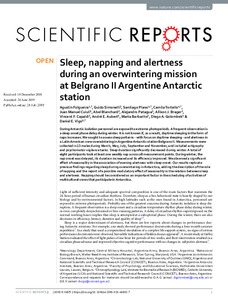Please use this identifier to cite or link to this item:
https://repositorio.uca.edu.ar/handle/123456789/8726| Título: | Sleep, napping and alertness during an overwintering mission at Belgrano II Argentine Antarctic station | Autor: | Folgueira, Agustín Simonelli, Guido Plano, Santiago Andrés Tortello, Camila Cuiuli, Juan Manuel Blanchard, Abel Patagua, Alejandro Brager, Allison J. Capaldi, Vincent F. Aubert, André E. Barbarito, Marta Golombek, Diego A. Vigo, Daniel Eduardo |
Palabras clave: | MEDICINA; SUEÑO; ESTADO DE ALERTA; SIESTA; HIBERNACION; INVIERNO; ACTIGRAFIA; MEDICIONES | Fecha de publicación: | 2019 | Editorial: | Nature Research | Cita: | Folgueira A et al. Sleep, napping and alertness during an overwintering mission at Belgrano II Argentine Antarctic station [en línea]. Scientific Reports 2019;9. https://doi.org/10.1038/s41598-019-46900-7. Disponible en: https://repositorio.uca.edu.ar/handle/123456789/8726 | Proyecto: | Cronobiología del aislamiento antártico: la utilización de la Base Belgrano II como modelo de desincronización biológica y análogo espacial | Resumen: | Abstract: During Antarctic isolation personnel are exposed to extreme photoperiods. A frequent observation is a sleep onset phase delay during winter. It is not known if, as a result, daytime sleeping in the form of naps increases. We sought to assess sleep patterns - with focus on daytime sleeping - and alertness in a Latin American crew overwintering in Argentine Antarctic station Belgrano II. Measurements were collected in 13 males during March, May, July, September and November, and included actigraphy and psychomotor vigilance tasks. Sleep duration significantly decreased during winter. A total of eight participants took at least one weekly nap across all measurement points. During winter, the nap onset was delayed, its duration increased and its efficiency improved. We observed a significant effect of seasonality in the association of evening alertness with sleep onset. Our results replicate previous findings regarding sleep during overwintering in Antarctica, adding the description of the role of napping and the report of a possible modulatory effect of seasonality in the relation between sleep and alertness. Napping should be considered as an important factor in the scheduling of activities of multicultural crews that participate in Antarctica. | Cobertura Espacial: | Antártida Argentina | URI: | https://repositorio.uca.edu.ar/handle/123456789/8726 | ISSN: | 2045-2322 (online) | Disciplina: | MEDICINA | DOI: | 10.1038/s41598-019-46900-7 | Derechos: | Acceso abierto | Fuente: | Scientific Reports N° 9, 2019 |
| Appears in Collections: | Artículos |
Files in This Item:
| File | Description | Size | Format | |
|---|---|---|---|---|
| sleep-napping-alertness.pdf | 1,36 MB | Adobe PDF |  View/Open |
Page view(s)
161
checked on Apr 27, 2024
Download(s)
209
checked on Apr 27, 2024
Google ScholarTM
Check
Altmetric
Altmetric
This item is licensed under a Creative Commons License

